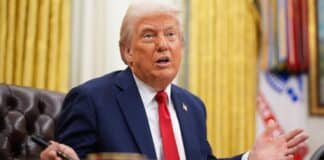An unlikely congressional contender from Virginia is so keen to take on the Democratic incumbent that he built an artificial intelligence chatbot to take the candidate’s place in the event that he is unable to appear in person.
The contest for Virginia’s 8th congressional district is virtually determined, with less than a month until election day. With over three-quarters of the vote, incumbent congressman Don Beyer easily won in 2022 in this heavily Democratic district.
Running as an independent, Bentley Hensel is a software programmer for the good governance organization CivicActions. He expressed frustration at Beyer’s alleged lack of attendance at further debates since September. Thus, he devised a novel scheme that will push the boundaries of propriety and technology: a discussion including Beyer’s likeness to artificial intelligence.
Furthermore, the candidate developed the AI chatbot on their own without Beyer’s approval.
Think of it as the equivalent of the empty seat on stage in the modern era. The AI, dubbed DonBot in jest, is being taught using information from the Federal Election Commission, press releases, and Beyer’s official websites. The ChatGPT creator OpenAI’s API serves as the foundation for the text-based AI.
In contrast to Beyer’s $1.5 million fund, Hensel, who has raised around $17,000 in outside contributions and personal loans for his campaign, stated that the bot is taught to give truthful responses and is not meant to deceive anyone. “Don Beyer is aware that staying out of the spotlight is the best course of action, but the people in this district should hear from him and the other candidates regarding the issues.”
The online discussion, which is scheduled for October 17, will match DonBot against Hensel and another independent, David Kennedy. Republican Jerry Torres, who has funded around $30,000 for the contest, did not respond to many emails or phone calls.
According to a Beyer spokesperson, he had attended a forum in September along with the other three contenders and had no intention of taking part in the debate in October, nor was there any additional activity planned by the campaign. She stated that he “continues to be a leading voice in Congress on the need to improve artificial intelligence regulation, including legislation to prevent nefarious actors from utilizing AI to spread election misinformation.”
According to an invitation seen by Reuters that was sent to all of the contenders, Hensel intends to develop an AI version of him as well, should Torres decline to participate as well.
Hensel and Kennedy agree the employment of AI is in part a last-ditch effort to add some attention to an otherwise predictable campaign. Hensel claimed that a desire for more openness drove him as well.
A relatively new technology that can instantly create complete text, video, and audio responses to basic questions will be put to the test during the discussion. In the midst of an AI investment frenzy—OpenAI reported this month that it had raised $6.6 billion—some technologists are concerned that the software could become sentient and cause catastrophic events, while others are concerned that convincing deepfakes of politicians or celebrities could harm people’s reputations and aid in the spread of false information.
Artificial intelligence has already been used to produce a voice that sounds similar to President Joe Biden in order to generate robocalls in New Hampshire to discourage people from participating in the state’s January primary. Donald Trump, the former president, shared an AI-generated photo of pop sensation Taylor Swift supporting his political candidacy.
DonBot, also known as CandidateGPT, was previewed exclusively by Hensel for Reuters. Generally speaking, the machine provided direct responses to policy-related queries, frequently referencing Beyer’s website as the original source.
When Reuters questioned DonBot about gun control, he said, “we are beyond a crisis point with guns in America” and that “halting gun violence has been a major focus of my work.” To another query, the software said “I firmly support a woman’s right to choose,” part of a five sentence response pointing to legislation Beyer has endorsed.
The software, in limited testing, did not succumb to oddball suggestions or questions with made up facts or statistics, known in AI circles as hallucinations. Noting that it was using inference, rather than Beyer’s own words, DonBot rejected the notion that the U.S. bomb Nebraska, for example: “Bombing any part of our own country is completely unacceptable.”
It refused to endorse Trump for president, saying “I have consistently opposed the previous president’s policies and approach.” It said it has not officially endorsed anyone for president. Beyer has in fact endorsed Democratic candidate Kamala Harris.
Deepfakes of politicians are outright prohibited, and at least 26 states are either debating or have already implemented legislation governing the use of generative AI in communications related to elections. However, in time for this year’s elections, federal regulators were unable to move forward with comprehensive AI legislation.
According to three Virginia lawyers and an election monitor who spoke with Reuters, Beyer probably wouldn’t be able to stop the debate from happening even if he tried, as long as his image wasn’t being exploited for profit or to trick voters by seeming like him. said Danielle Citron, a University of Virginia law professor. She indicated that only sexual content is covered by Virginia’s deepfakes ban.
“They need to be very clear that it is an AI and that it’s based on the candidate’s own words,” said Danielle Citron, a University of Virginia law professor. She stated that a Virginia ban on deepfakes applies narrowly to sexual content.
Beyer’s spokesperson only stated that he had no plans to participate in the debate; she did not address whether his campaign would attempt to stop it from happening. The state election board of Virginia did not reply to a message seeking comment.
Beyer is a member of a bipartisan congressional working force on artificial intelligence in addition to attending classes on the subject at George Mason University in Virginia.
Kennedy claimed he had agreed to the AI debate because of the “non-competitiveness” of the race and the expectation that it would force Beyer to appear. Kennedy is a senior fellow at the Council on Governmental Relations and has received roughly $13,000 in contributions and personal loans. According to Beyer’s spokesperson, he participated in an online forum on Monday among the other contenders.
Two nonprofit organizations, the Black Alumni Alliance National Association and the True Representation Movement, are sponsoring the online debate. Legislative candidates who pledge to vote on measures based on input from a group of 1,000 anonymous voters representing a range of opinions are supported by the True Representation Movement.
Hensel stated, “I am not naïve about what’s going to happen in November,” in reference to Beyer’s sizable lead in the polls. “But I really think there should be more transparency.”






